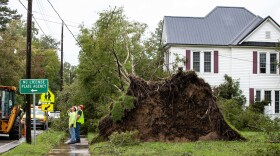Lawmakers focused on improving school safety for months have planned to address a significant shortage of school psychologists, but none of the related bills filed by legislators look like they are going anywhere during this legislative session. "Everyone says we need more school psychologists in our schools for counseling, [to] keep our kids safe, all those good things," said Representative Josh Dobson, who served on the House Select Committee on School Safety.
State representatives serving with him on that committee - convened just after the Parkland, Fla., shooting - have often said that improving mental health services in schools is part of the battle for safer schools. And North Carolina is facing a shortage of school psychologists who are on the frontline. Experts say the high number of students per psychologists in public schools is making it hard for them to do their jobs effectively.
"At the state level, we are in a crisis for school psychologists," said Sara Ryan, a school psychologist in Union County Schools and a board member of the North Carolina School Psychology Association.
Across North Carolina, there are about 75 school psychologist vacancies as of the 2017-2018 school year, according to a recent state report. Many school psychologists employed in the state serve multiple schools and more than 2,000 students each. The nationally recommended ratio is one psychologist per 500 to 700 students.
"I'm not sure that anyone working in North Carolina is following best practices in school psychology given our current ratios of students per psychologist," said Ryan, adding that with the current staffing rations, it is very difficult to provide comprehensive mental health services -- the kind of services that help identify and counsel at-risk youth.
One bill proposed by House Republicans, including Dobson, would have streamlined the process for hiring school psychologists who have a national board certification. That would make it easier to license and hire qualified psychologists, especially those who move from other states. Experts say the state's non-competitive pay is also an issue for recruitment - but that the proposed licensing change would help combat the shortage.
The proposal had broad support, and passed unanimously in the House, but the bill failed after the Senate tacked on a controversial and unrelated healthcare provision. Then the Senate stalled the House's attempts to resurrect the psychology provision in another bill about licensing regulation in various industries. That bill did not make it past the legislature's self-imposed deadline to send all statewide bills to the governor's desk.
"I was disappointed, obviously I was disappointed," said Dobson. "There were things added in the Senate that made it problematic, but to be clear, the school psychologist issue had nothing to do with why the bill failed. If it was just that, it would have passed unanimously."

Other bills aimed at relieving the shortage of school psychologists have also fallen flat. A House bill filed by the same Republican sponsors behind the licensure measure would have increased the compensation for school psychologists and created a program for their recruitment and retention. That bill never made it out of committee. Another filed by Senate Democrats to "fully fund school psychologists and counselors" and bring their position-to-student ratios to nationally recommended standards also did not move forward after being introduced.







